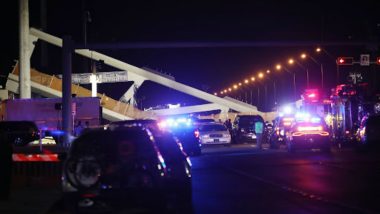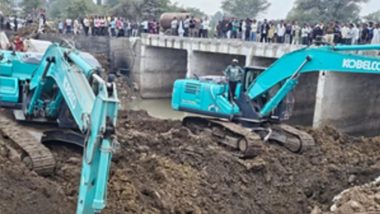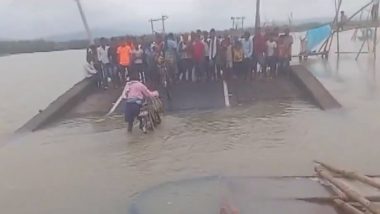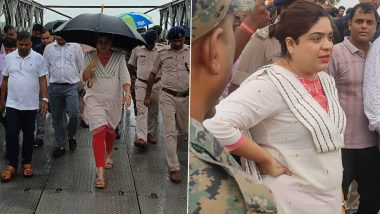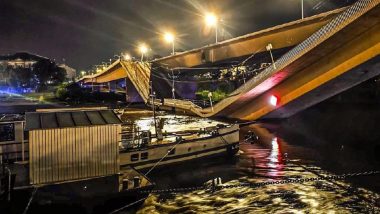Miami, March 16: Florida officials said today that four people have been found dead in the rubble of a collapsed South Florida pedestrian bridge where the frantic search for any survivors continued past nightfall. Fire Chief Dave Downey said at a news briefing that four deceased people were found amid the chaotic scene of concrete rubble and crumpled vehicles. He said nine victims were removed "early on" and taken to hospitals but didn't elaborate on their conditions. He said the "search and rescue mode" -- deploying trained canines, search cameras and sensitive listening devices -- was continuing into the night.
Governor Rick Scott also spoke to reporters, saying "everybody is working hard to make sure we rescue anyone who can be rescued." The Florida governor added that an exhaustive investigation now beginning will get to the bottom of "why this happened and what happened" and vowed that anyone who did anything wrong would be held accountable.
Miami-Dade police director Juan Perez praised the actions of first responders during a news conference but acknowledged the likelihood of finding more victims under the rubble was growing more difficult with the passage of time. "We know that there's going to be a negative outcome at the end of the day," Perez said.
The bridge was under construction and collapsed onto a busy Miami highway yesterday, crushing at least eight vehicles under massive slabs of concrete and steel. One side of the bridge led to Florida International University, a school west of the city's downtown. Search-and-rescue crews drilled holes into the debris and used their highly trained dogs to look for survivors. They had to work carefully because part of the structure was still unsafe. At least 10 people were taken to hospitals. The number of fatalities was not immediately known.
The 950-ton bridge had been assembled by the side of the highway and moved into place Saturday to great fanfare. The span stretched almost 60 meters to connect Florida International University with the city of Sweetwater. It was expected to open to foot traffic next year.
"This bridge was about goodness, not sadness," said FIU President Mark Rosenberg. "Now we're feeling immense sadness, uncontrollable sadness. And our hearts go out to all those affected, their friends and their families. We're committed to assist in all efforts necessary, and our hope is that this sadness can galvanize the entire community to stay the course, a course of goodness, of hope, of opportunity."
Jacob Miller, a senior at FIU, was visiting a friend in a dorm when he heard sirens and horns honking. He went to a balcony and could see rubble coming down. "I saw there were multiple cars crushed under the bridge. It was just terrible. I saw some people stopping their cars, trying to get out, trying to assess the situation to see if there is anything they could do to help," he said.
National Transportation Safety Board chairman Robert Sumwalt III said a team of specialists was heading to Miami on Thursday night with plans to begin its investigation Friday morning. Miami-Dade Police Director Juan Perez said his department's homicide team would take over the investigation after rescue efforts are complete.
The exact death toll was unclear. Florida Highway Patrol Lt. Alejandro Camacho told CBS News that there were "several fatalities." Carlie Waibel, a spokeswoman for Senator Bill Nelson, said local officials told Nelson that people had died, but a final number had not been confirmed.
An accelerated construction method was supposed to reduce risks to workers and pedestrians and minimize traffic disruption, the university said. Renderings showed a tall, off-centre tower with cables attached to the walkway to support it. When the bridge collapsed, the main tower had not yet been installed, and it was unclear what the builders were using as temporary supports.
Robert Bea, a professor of engineering and construction management at the University of California, Berkeley, said it was too early to know exactly what happened, but the decision to use what the bridge builders called an "innovative installation" was risky, especially because the bridge spanned a heavily travelled thoroughfare.
"Innovations take a design firm into an area where they don't have applicable experience, and then we have another unexpected failure on our hands," Bea said after reviewing the bridge's design and photos of the collapse. Sweetwater police Detective Juan Llera was in a nearby meeting when the bridge collapsed. "I heard a 'boom' like a bomb had exploded," he said. "At first I thought it was a terrorist attack."
He said he saw three construction workers who had been injured. One had a head injury and was passing in and out of consciousness, another one had a leg injury leg and the third was lying on the street unconscious. He started performing CPR on him. "We were able to keep him alive to send him to the hospital," Llera said. Kendall Regional Medical Center received 10 injured people. Of those, two were in "extremely critical" condition and the other eight were stable with injuries such as broken bones, bruises and abrasions, said Dr. Mark McKenney, the hospital's director of general surgery.







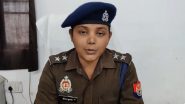


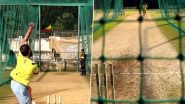


 Quickly
Quickly









